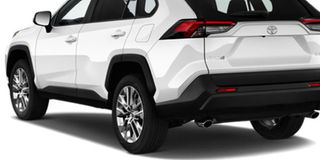Dangers of driving a car with damaged brake discs

Hello Paul, four months ago, I bought new front brake pads for my Toyota Prado TX. Post lockdown, I noticed that the brakes make noise and take longer to work. I have been advised to replace the brake pads and expensive brake discs which have developed big deep grooves. Why have the brake pads damaged the front discs and can I just replace the brake pads? Charlotte
Hello Charlotte, brake discs or rotors are an important component of the brake system. Brake disc rotors provide the coarse friction required by the brake pads to stop your car when you apply the brakes. The condition of the brake discs will affect the efficiency of your car’s braking.
Poorly designed or rebonded brake pads can damage the brake discs when their friction material wears out and their rivets score deep grooves on the brake disc surface. Shallow grooves can be skimmed off provided the minimum safe disc width is maintained. In extreme cases, such as yours, you need to replace the brake discs.
Deep grooves on brake discs caused by the pad rivets usually damage the discs beyond repair by skimming. It is not advisable to replace only the brake pads while retaining the damaged discs. The new brake pads will not be able to brake efficiently because the pad surface only makes contact with the highest points on the disc. Severely damaged brake discs spoil the friction material on new brake pads as they work.
Hello Paul, I have just bought a used Toyota ST190 from Japan with more than 100,000kms mileage. The mechanics are advising me to remove the thermostat ahead of a maiden journey to Kabale. I have ordered one but it will take two months to arrive. Can I remove the old one and drive without a thermostat, even if the car is running fine?
Wilber
Hello Wilber, the engine thermostat should not be removed unless you plan to replace it with a new one. Outright removal of the thermostat will cause over cooling of the engine which leads to the engine management computer running it at higher revolutions. This creates poor fuel economy as well as leads to gradual engine damage due to overcooling.
When an engine thermostat fails, the common symptoms are: high temperature gauge readings within the first 10 minutes after a cold start, erratic temperature changes or leaking coolant around the thermostat housing.
If you do not have symptoms of thermostat failure, get a good mechanic to service the coolant fluid with three litres of concentrate Shell guard mixed with clean water on a 50:50 basis; one litre of coolant with one litre of wate
This will lubricate the cooling system and protect it from corrosion and overheating. This should protect your car’s cooling system until the new thermostat arrives.
At 100,000kms plus, you ought to consider replacing the timing belt and roller as well as the long life fuel filter and spark plugs.
Hallo Paul, I bought a used 1998 Premio from the bond for Shs15m. The engine is intact but a number of things on the body seem old. Do you think I could have been cheated?
Meshach
Hello Meshach, often, it is challenging to determine a good price or fair value for a used car. The value of a car can be calculated using a few tools and guidelines or a combination of both such as depreciation value, expert opinion from car sales people or mechanics, market value on the local used car market or online car market, registration from date of first sale, mileage and condition of the car, history and resale value.
Depreciation is the reduction of the value of an asset overtime, in this case your car.
In Uganda, the depreciation of new or used cars is usually 20 per cent per annum. If a used car left the bonded warehouse at Shs26m, every year, it will lose Shs5.2m.
After two years, the resale value will be Shs15.6m. Some cars, such as the Toyota Premio have an excellent resale value, which can influence maintenance of a high price or value because of demand.
A car’s registration series and mileage can also influence its value. In Uganda, buyers tag a higher value to the newness of registration, often at the expense of or regardless of the mileage on the clock, car history or technical condition.
Mileage and car history give an indication of how ‘young’ a car is or how ‘hard’ it has worked.
Car history on the other hand also tells us if the car has had major mileage based service procedures/repairs carried out or has a major accident record, which is crucial in determining value for money.
A car inspection and technical report can also guide you to determine its value based on the condition and costing of repairs needed.




